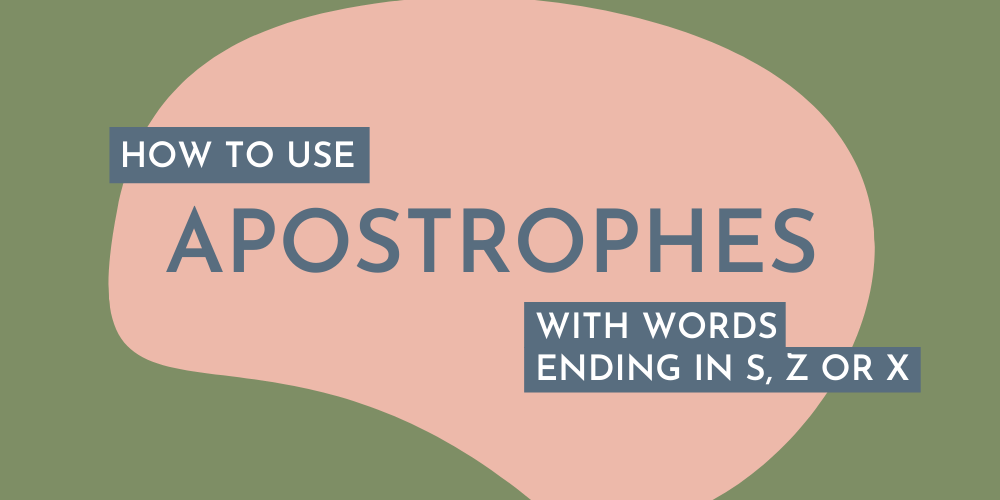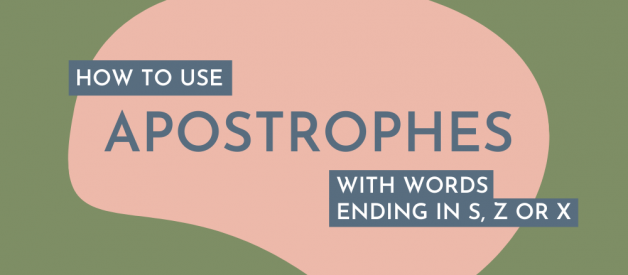
Using apostrophes with possessive nouns gets a little more confusing when the noun ends in a sibilant (an s, z or x sound). These nouns might end in one of those letters, or they might also end in se, ze, ce or xe.
The rules
Common nouns ending in an s, z or x sound should generally take an apostrophe and an s when indicating possession.
? The abacus?s beads.? Your boss?s husband.? The fez?s colour.? The US?s unemployment rate.? The box?s lid.
This is recommended by most style guides and authorities, including MLA, the BBC, The Economist and the OUP.
The exceptions
But many of these words sound and look awkward with the extra s, and in these cases ? particularly when it would match pronunciation ? it is encouraged to omit the extra s.
? Spelling is my Achilles? heel.
On that note, many authorities suggest that classical and biblical names ending in an s sound (particularly if they contain more than one syllable) shouldn?t take an s after the apostrophe.
? We can all learn something from Jesus’ teachings.? Moses’ early life is very interesting.
Reword your sentence
And if it?s just too awkward all-round, consider changing your possessive noun to an of, on, from, for to, in or another possessive or prepositional construction, or even transforming the possessive noun into an adjective.
? The beads on the abacus / the abacus beads.? The husband of your boss.? The colour of the fez.? The unemployment rate in the US / the US unemployment rate.? The lid for the box / the box lid.
There?s some contradictory advice out there about not using an s after the apostrophe for a word ending in an s sound ? if the word that proceeds it also starts with s. So, the abacus?s significance should be the abacus? significance.
It?s hard to know for sure what to do in situations like these. This is grammatical grey territory ? it?s so heavily contested that there?s no clear right or wrong, and even the major style guides disagree. Check with the style guide you?re writing for, and if it?s not mentioned, or you?re not following one, stick as closely as possible to the way you?d pronounce it. Above all, stay consistent! If you use it one way, make sure you stick to that.
Using apostrophes with words that end in a silent s, x, and z
When we steal words from French, sometimes we end up with nouns that end in a silent s, z or x. I?m talking about words like faux-pas, vis–vis and hors d?oeuvres. Some of them are even words that we now consider English words, like Illinois or Arkansas. Although the extra s sound is always pronounced in possessive cases of these nouns, there is some debate about whether the extra s is required in writing.
? Bordeaux?s population versus Bordeaux? population? Descartes?s philosophy versus Descartes? philosophy? Illinois?s governor versus Illinois? governor
The reality is that both are acceptable. Some writers and editors won?t add the extra s; others will. If it?s not mentioned in your style guide or you?re not following one, it comes down to personal preference. Once again, stay consistent in your usage. I?d recommend adding the s, as it?s most likely how you?d pronounce the word, and it?s consistent with singular noun apostrophe rules.
Using apostrophes with plural nouns ending in a silent s, z or x
On the very rare occasion that you find yourself trying to form the plural possessive of a word ending in a silent s, z or x, it?s best to add an apostrophe and then an s (like you?d do for a singular possessive noun).
? The Verraux?s hometown is not far from here.? The two Dumas?s works are surprisingly disparate.
There?s also no clear rule for citing French titles with silent plural endings (Les Annes Magnifiques). Some add just an apostrophe (Les Annes Magnifiques? release date), while others add the (Les Annes Magnifiques? release date).
If you find yourself in an apostrophe nightmare, it?s best to keep things as simple, consistent, and as reflective of spoken English as possible. Find out more about apostrophes here.
Originally published at https://writetoedit.com/how-to-use-apostrophes-with-words-ending-in-s-z-or-x/


